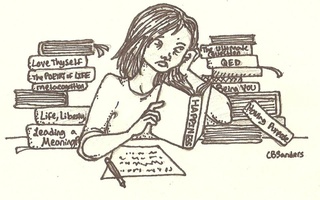Women who drink coffee regularly are less likely to suffer from depression than women who do not, according to a Harvard School of Public Health study released Tuesday.
The study stated that women who drink coffee four or more times daily are 20 percent less likely to become depressed than women who drink fewer than one cup of coffee a week. Women who drink coffee two to three times a day are 15 percent less likely to suffer from depression.
Coffee, which is often associated with boosting energy in the short term, is the source of 80 percent of caffeine intake worldwide. This study, however, dealt with the long term effects of the drug.
Harvard scientists, led by Michel Lucas, a research fellow in the Department of Nutrition at HSPH, tested over 50,000 women between 1980 and 2004. The women tested were primarily middle aged.
The researchers said they chose to focus on women, as they are much more likely to suffer from depression than men. Twenty percent of women develop depression in their lifetimes, according to the researchers.
While the study has profound implications on research related to the brain’s reaction to caffeine, Lucas warned that the results are “very preliminary” and “need to be confirmed.”
Lucas noted that it is too soon to say if caffeine can be used to treat depression, adding that side effects of the drug include higher blood pressure in the short term.
Alberto Ascherio, an author of the study and a Harvard professor of epidemiology and nutrition, noted that other factors could have contributed to the lower rate of depression among coffee drinkers.
The team of Harvard researchers is working on studies linking other factors, such as physical activity and television watching, to depression. These studies may appear as soon as next week.
“Most people already drink coffee at the level that is good for them,” Ascherio said.
Although the study focused mainly on caffeinated coffee, researchers also tracked the women’s consumption of decaffeinated coffee, tea, soft drinks and chocolate—foods with comparatively negligible traces of caffeine. The study tied decreased risk for depression only to caffeinated coffee.
Read more in News
University Revises Library StructureRecommended Articles
-
Four Loko is LocoThe misuse of Four Loko shows once again that American teenagers are not responsible enough to consume alcoholic beverages safely.
-
School of Public Health Study Finds Link Betwen Depression and StrokeHarvard researchers have provided some of the most conclusive analysis to date indicating that depression can increase the risk of stroke.
-
New Blood Test May Help to Diagnose DepressionA new blood test designed at Massachusetts General Hospital appears to accurately indicate whether a person is suffering from depression, according to a paper published in Molecular Psychiatry.
-
 The Sad Socrates Effect
The Sad Socrates Effect -
Better Isn't Good EnoughThirty-six percent of graduating seniors “sought help” for mental health. I wonder, though, how many were truly helped.
-
 Wife of Massachussets' Longest-Serving Governor Endorses Electroconvulsive Therapy
Wife of Massachussets' Longest-Serving Governor Endorses Electroconvulsive Therapy













